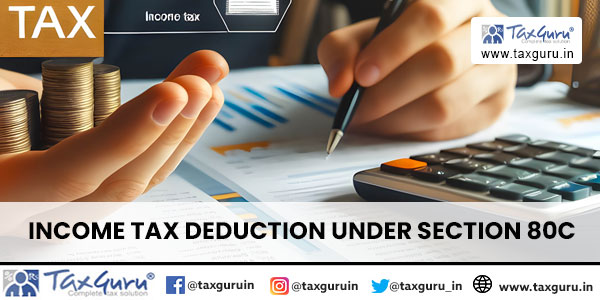Section 80C of the Income Tax Act provides taxpayers with an avenue to reduce their taxable income by investing in specified financial instruments or expenses. This section offers a maximum deduction of ₹1,50,000 per financial year. Understanding the nuances of Section 80C is crucial for individuals and Hindu Undivided Families (HUFs) to optimize their tax planning strategies. From eligible investments like life insurance premiums and PPF to tuition fees and home loan repayments, Section 80C offers various avenues for tax-saving.
Q.1 What is Section 80C of the Income Tax Act?
Ans. Section 80C of the Income Tax Act allows taxpayers to claim deductions from their taxable income by investing or spending on specified financial instruments or expenses. The maximum deduction under this section is ₹1,50,000 per financial year.
Q.2 Who is eligible to claim deductions under Section 80C?
Ans. Individual taxpayers and Hindu Undivided Families (HUFs) are eligible to claim deductions under Section 80C.
Q.3 What investments qualify for deductions under Section 80C?
Ans. Eligible investments and expenses include:
- Life Insurance Premiums
- Employee Provident Fund (EPF)
- Public Provident Fund (PPF)
- National Savings Certificates (NSC)
- Tax-saving Fixed Deposits (FDs) of 5 years or more
- Senior Citizens Savings Scheme (SCSS)
- National Pension System (NPS)
- Equity Linked Savings Scheme (ELSS)
- Sukanya Samriddhi Yojana (SSY)
- Principal repayment on home loans
- Tuition fees for children’s education (maximum of 2 children)
- Stamp duty and registration charges for the purchase of a residential property
Q.4 Is the maximum deduction limit of ₹1,50,000 applicable to each investment separately?
Ans. No, the maximum deduction limit of ₹1,50,000 is the total combined limit for all investments and expenses under Section 80C in a financial year.

Q.5 Can the deduction under Section 80C be claimed for the education of more than two children?
Ans. No, the deduction for tuition fees under Section 80C is available for a maximum of two children per taxpayer.
Q.6 Are there any specific requirements for claiming life insurance premium deductions?
Ans. Yes, the life insurance policy must be in the taxpayer’s own name, spouse’s name, or children’s name (dependent or independent). The premium paid should not exceed 10% of the sum assured for policies issued after April 1, 2012, and 20% for policies issued before that date.
Q.7 Can I claim a deduction for home loan principal repayment under Section 80C?
Ans. Yes, the principal repayment of a home loan is eligible for deduction under Section 80C, subject to the overall limit of ₹1,50,000. However, the property should not be sold within five years of possession; otherwise, the claimed deductions will be added back to your income in the year of sale.
Q.8 Is the interest on the home loan covered under Section 80C?
Ans. No, the interest on a home loan is not covered under Section 80C. It is covered under Section 24(b) of the Income Tax Act, which allows a separate deduction for interest on housing loan.
Q.9 Are investments in ELSS completely tax-free?
Ans. Investments in ELSS are eligible for tax deduction under Section 80C up to ₹1,50,000. However, the returns earned and the withdrawals after the 3-year lock-in period are subject to long-term capital gains tax.
Q.10 Can I claim a deduction under Section 80C for investment in tax-saving fixed deposits?
Ans. Yes, tax-saving fixed deposits with a tenure of 5 years or more are eligible for deduction under Section 80C, up to the overall limit of ₹1,50,000.
Q.11 What is the lock-in period for PPF investments under Section 80C?
Ans. The lock-in period for Public Provident Fund (PPF) investments is 15 years.
Q.12 Are contributions to the National Pension System (NPS) eligible for deduction under Section 80C?
Ans. Yes, contributions to the National Pension System (NPS) are eligible for deduction under Section 80C. Additionally, an extra deduction of ₹50,000 is available under Section 80CCD(1B) for NPS contributions, over and above the ₹1,50,000 limit of Section 80C.
Q.13 Can I claim deductions under Section 80C for previous years?
Ans. No, deductions under Section 80C can only be claimed for the financial year in which the investments or expenses are made. Retroactive claims are not allowed.
Q.14 How do I claim deductions under Section 80C in my income tax return?
Ans. To claim deductions under Section 80C, you need to list your eligible investments and expenses in the appropriate section of your income tax return form. Ensure you retain all investment receipts and relevant documentation as proof.
Conclusion: Navigating the realm of income tax deductions can be complex, but Section 80C simplifies tax planning by offering a range of investment options. Whether it’s contributing to an Employee Provident Fund (EPF), investing in ELSS, or repaying a home loan principal, taxpayers can leverage Section 80C to reduce their tax burden. However, it’s essential to understand the intricacies, such as the maximum deduction limit, eligibility criteria, and documentation requirements, to ensure compliance and maximize tax benefits. By utilizing Section 80C effectively, taxpayers can optimize their tax planning and achieve financial goals while staying compliant with income tax regulations.





